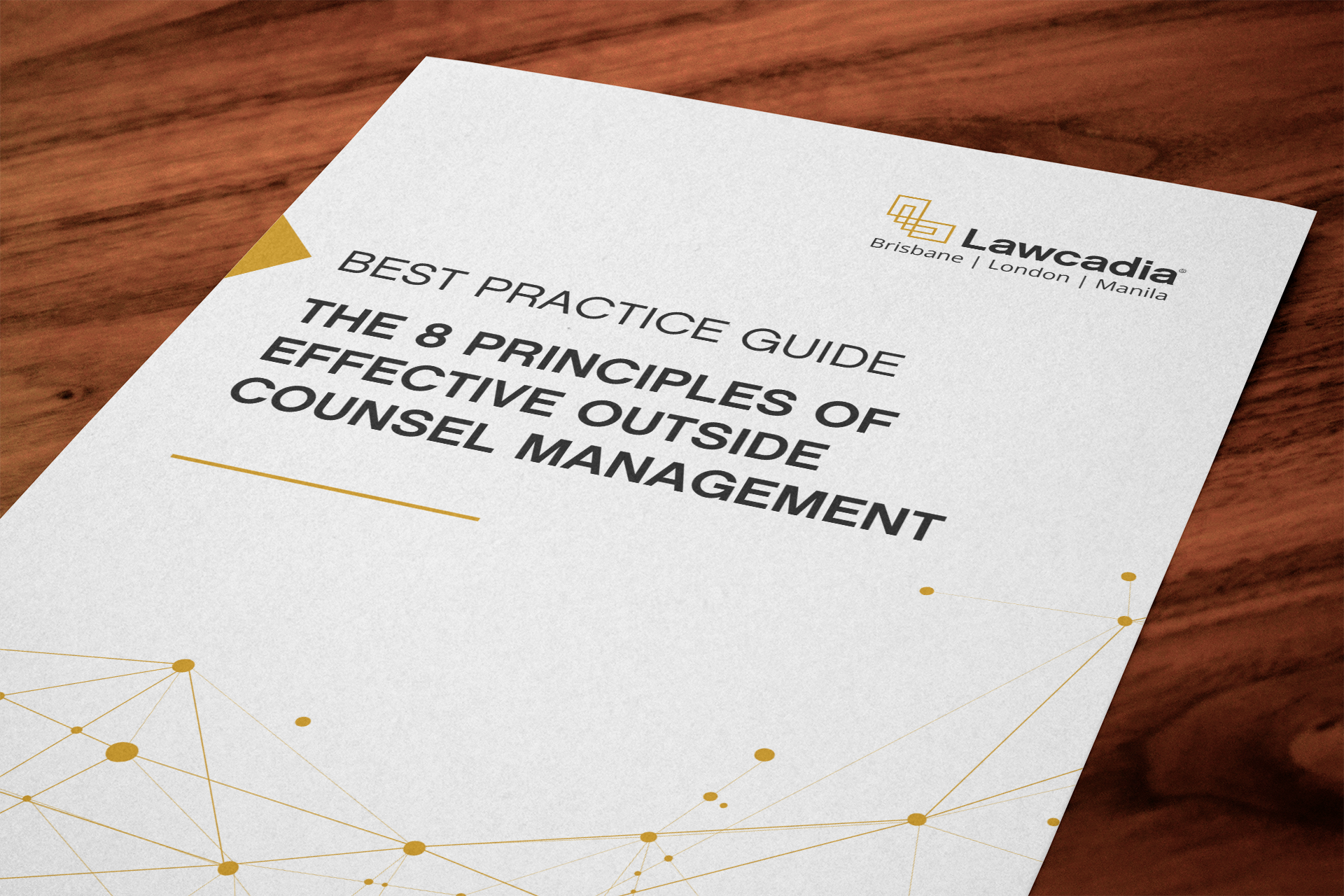Lawcadia has released a Best Practice Guide: The 8 Principles of Effective Outside Counsel Management. In today’s fast-paced and ever-evolving legal landscape, it is imperative for in-house legal teams to forge strong, collaborative relationships with outside counsel. The ability to manage these relationships effectively not only ensures the delivery of quality legal services but also optimises resources and reduces risks for organisations.
This guide aims to provide you with a comprehensive understanding of the eight fundamental principles of effective outside counsel management, empowering you to maximise the value of these partnerships while maintaining efficiency, transparency, and control. Let us embark on this journey together to unlock the full potential of your organisation’s legal services.
Introduction
Organisations across the globe are facing an increasingly complex, uncertain and demanding environment in which to operate and never more so than for their legal departments. Indeed, recent research reported that 85% of legal teams are prioritising the control of external legal spend to meet their organisations’ financial and strategic goals. While there is a consensus on the importance of controlling spend, the same research highlighted that the methods currently used by legal departments lack sophistication. While discounted rates and general billing guidelines can be effective, there is an opportunity to develop a more comprehensive approach to the engagement and management of outside counsel that will have a measurable impact.
Adopting a best practice approach to outside counsel management will enable legal teams to manage costs and risks better, enhance service delivery, ensure strategic alignment, and demonstrate value. To help General Counsels future-proof their legal function and introduce proven strategies and tactics, we have distilled best practice outside counsel management to incorporate the 8 principles discussed in this Best Practice Guide.
Your legal department may already be mature in its operations across several of these principles. To assist with your evaluation, we have also provided a checklist to help you map where you are and identify the areas that need attention. For those legal departments that are less mature or only just now turning their minds to improving their outside counsel management, we have provided a helpful section on “getting started”.
“Adopting a best practice approach to outside counsel management will enable legal teams to better manage costs, enhance service delivery, ensure strategic alignment, and demonstrate value.”
1. Panel of law firms aligned to organisational values and drivers
Many organisations may have a formal panel of legal services providers, while others may have an informal panel of law firms that they utilise for their external legal engagements. Regardless of how you set-up your providers, your external law firms must be considered an extension of your internal legal function, and as such, strategic alignment on values and goals is crucial for success.
Getting this principle right will have a flow-on effect on how you engage, work with, and evaluate your law firms. Some organisational drivers and strategic goals may be highly oriented towards shareholder value, enabling diversity and inclusion, digital transformation, teamwork, or innovation. Each organisation is different, so start by understanding the unique goals and drivers of your organisation and translating how your legal function can reflect these in the way that you operate and measure success.
These are examples of how organisational goals, values, or drivers could influence your outside counsel management.
Expertise and experience:
- Ensure that the law firms that advise your organisation have a high level of expertise and experience across the main practice areas in which you brief out
- Have confidence that the law firms understand your industry through advising similar clients
- Ideally, law firms will have prior experience with your organisation and key decision-makers
- Remember that you don’t need top-tier law firms for everything, as smaller firms and boutique firms can have excellent experience in specific practice areas
Diversity and inclusion:
- Law firms included on the panel are vetted for diversity and inclusion practices
- The legal team has processes in place to measure and evaluate law firms on diversity and inclusion metrics as it relates to the lawyers and barristers who are doing the work
- Regular reviews with their panel law firms to hold them accountable for taking further action on diversity and inclusion at their firm
To continue reading this guide, download an unrestricted copy today: The 8 Principles of Effective Outside Counsel Management

